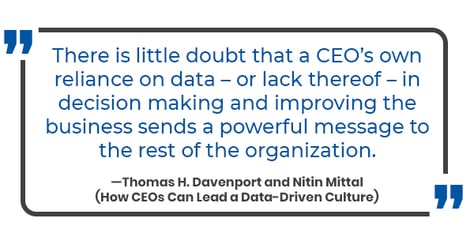
Today, most HR teams feel pressured to show the value of what they do, measure the value of human capital, and show how people programs impact productivity and their company's bottom line.
If you are feeling it, you are not alone. For over ten years, leading research firms, professional HR associations, and consultants have been telling HR we need to become data-driven. If we don't, they imply, our competition will run us over like a steamroller flattening the Roadrunner.
The story is that most of HR lags in analytics and needs to upskill to become data-savvy. True, some companies have made genuine progress, but they are technology-based data natives like Google or have had the resources to spend years getting it right. Most still struggle or wonder how to get started.
The Real Reason HR Lags in Data Analytics
We can see why. How do you become data-driven and analytics savvy when locked in a culture that doesn't value data?

In organizations, top leadership drives culture, especially the CEO. If the CEO doesn't value analytics capability and the superior decision-making that can flow from it, there can be little momentum toward becoming data-driven. In recent separate surveys, Deloitte and NewVantage Partners found that mindset to be prevalent in most organizations.
- 63% of US executives do not believe their companies are analytics-driven. (Deloitte)
- 67% say they are not comfortable accessing or using data. (Deloitte)
- Only 31% of companies say they are data-driven, a decline from 37% in 2017. (New Vantage Partners)
However, there are three reasons it's now your time to take the lead in using people data to build a higher-performing organization:
- You want to do it. If you didn't, you wouldn't be reading this. Whether from a sense of self-preservation, a desire to add value, or both, we want to make better decisions.
- You need it. The value in people data doesn't just affect HR. It drives the entire organization. The old idea of "we do business and HR does people stuff" doesn't work anymore. HR's role is to help the organization become people-oriented—because that's the way the value of people is at its best.
- It's required. Our innovation-driven, talent-driven, and knowledge-based economy creates external pressure on companies to measure and report on the value of their people. Human capital and culture now comprise an average 52% of a company's market value. Regulatory agencies, private equity firms, and institutional investors demand that companies show that value to stakeholders. Even privately held companies will come under pressure to conform. This requirement is motivating CEOs right now.
So, we must report the value of our human capital, tell stakeholders what we do to maintain and improve it, and align learning and talent activities and programs to business strategies.
We can do that by developing the right measures and creating data-driven teams.
What Does Data-Driven Mean?
Data-driven HR, or intelligent HR, is about using data in a "smart way and extracting insights that not only improve the performance of people within the company (including its HR team) but also contribute to the overall success of the organization" (Bernard Marr)
The possibilities for constructive data use are unlimited, but Marr shows us four primary ways an organization can use data:
- Using data to make better decisions. We have seen and took part in enough case studies in hiring practices to know that data-informed algorithms can make better decisions than hiring managers. A bad hire can be costly. Anything you can do to reduce the probability of failure will be a net gain for your company. But doesn't mean that algorithms should decide unassisted. They can't replace the value of human judgement.
- Using data to improve operations. There are thousands of ways to reduce costs and save time by analyzing workflows and communications. Data analysis of candidate sourcing and employee success can show you where to source your organization's best people.
Onboarding is ripe for analysis. A North American recreational equipment distributor, one of our customers, improved sales force turnover by giving their new salespeople control of their own development. - Using data to understand your customers better. In HR's case, the customers are employees, managers, and executives. People data (with appropriate controls) can give you dozens of ways to improve the employee experience. Employee surveys are becoming obsolete as we find ways to analyze people's interactions to understand employees' beliefs, attitudes, and behaviour.
- Monetizing data. Profiting from employee data sounds problematic to us. GDPR and regulations coming out of California restrict what you can do, even before considering what is proper and ethical. However, if you could monetize anonymous data and be completely transparent about it, there might be some possibilities.
Getting the CEO and Managers on Board
It might seem unlikely that you can bring decision-makers along if they are bound by the idea that their gut instincts and judgment are the only way to make decisions. However you can gently lead them to a new point of view.
Frame your discussion as a way for them to solve their problems. Help them see that they can learn a lot about leading their people to greater productivity using the data their people create.
We see three ways that we might influence their thinking (use all three):
- Show them some case studies of well-respected companies that have used people data to make their companies more competitive without an enormous investment.
- Show them discoveries in your data that lead to you better decisions and faster results.
- Do a quick "skunk works" project with your allies in the business to prove how it works.
You can build a data-driven HR team. You can also lead your organization to a data-driven future if you involve the entire organization in the effort.
Pixentia is a full-service technology company dedicated to helping clients solve business problems, improve the capability of their people, and achieve better results.

